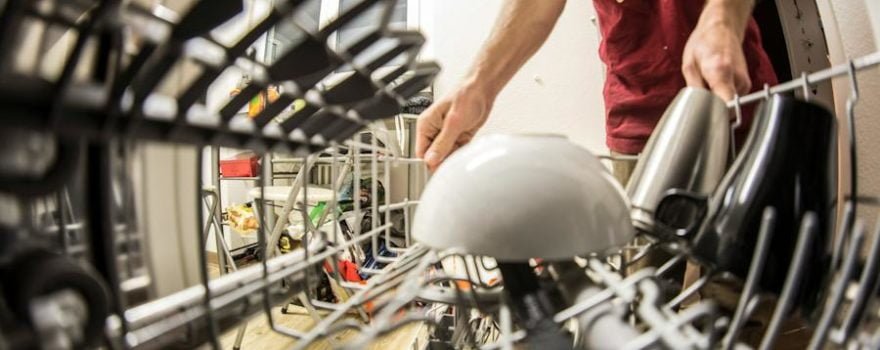
Research has shown that households that have dishwashers used on average 50% less water and 28% less energy than those that washed up by hand. It’s commonly believed that dishwashers are more expensive to run – but if you use them efficiently they can be significantly cheaper than running your tap. So which is cheaper: dishwasher vs hand washing? Read on…
Cost Comparisons

One cycle in a typical dishwasher costs the same in energy and water as running the hot tap for six to nine minutes or filling four to six washing up bowls full of water. This equates to actually saving more by fully loading the dishwasher up once. Getting dishes clean in the sink can use up to 123 litres of water per load – an energy starred certified dishwasher can use as little as 11 litres per load, saving almost 23,000 litres of water per year.
Rinsing your dishes by hand before putting them into the dishwasher is very wasteful – new dishwashers can handle food remnants as long as you scrape off the majority into the bin. Remember that it takes the water of about 60 degrees Celsius to fully sanitise dishes – your hands just can’t cope with that temperature.
Simple Ways to Cut Energy and Water Use

An energy efficient setting or eco-setting uses less power to heat the water – and making sure the dishwasher is full before turning it on is best. Don’t use half load cycles as these can use more than half the energy and the water of a full load. Energy efficient settings defined by an energy performance certificate UK use around a third of the water that would be used when washing up by hand.
If you can’t fill your dishwasher daily then use the rinse and hold feature – this prevents the food from drying and sticking until you reach a full load capacity. Most new dishwashers have internal heaters that warm up water way more efficiently than a boiler – using less than half the energy of washing dishes by hand.
Items Unsuitable for Dishwasher Cleaning
There’s a general guide for things that can’t be washed in the dishwasher and these include:
- Aluminium pans– these will eventually discolour as they react to the detergent solution
- Cast iron pans– uncoated pans will rust
- Wooden spoons– will swell and crack
- Antique china– colours will fade due to the intensity of the heat
- Sharp knives– will quickly dull if continually washed in the appliance
A Highly Recommended Dishwasher
You’ll need to consider your space and your budget before you make a purchase – a cheap slimline dishwasher option is the Whirlpool ADG522UK which accommodates up to 10 place settings and gives you a choice of eight programmes. These dishwashers are both environmentally and economically sound – saving up to 50% in energy, water, and time.
6th Sense intelligent sensors detect the level of soiling and then automatically adjust the wash cycle and pressure to suit. The machine is operated via a digital display and features a delay start timer, super silent motor, and A++ energy rating – offering you a versatile dishwashing solution.
Caring for Your Dishwasher
Regular dishwasher maintenance will keep your appliance running as well as possible – scraping off excess food will avoid blockages, and specialist cleaning products can be used for cleaning mineral deposits. Leaving the door open between washes will avoid the build-up of mould and bacteria, and prevent unpleasant smells.
Keep the rinse aid tank topped up, and clean the seals with a bleach-free detergent. Clean the filter, remove and clean the spray arms and run the dishwasher empty and hot. If you ever need a reliable and low-cost dishwasher repair you should contact a trusted service provider such as Mix Repairs.



